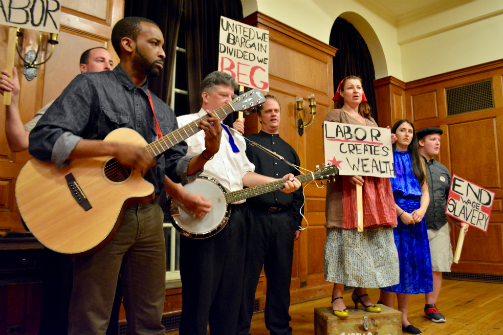The Iron Heel
Adapted and Directed by Edward Einhorn; Based on the novel by Jack London
Produced by Untitled Theater Company No. 61
Off Off Broadway, Play
Runs through 8.27.16
South Oxford Space, 138 South Oxford Street
by Sarah Weber on 8.12.16
 Craig Anderson, Kevin Argus, Charles J. Ouda, Yvonne Roen, Victoria Rulle, Trav SD, and Mark Hustein in The Iron Heel.
Craig Anderson, Kevin Argus, Charles J. Ouda, Yvonne Roen, Victoria Rulle, Trav SD, and Mark Hustein in The Iron Heel.
Photo by Arthur Cornelius.
BOTTOM LINE: An adaptation of Jack London’s 1908 novel that predicted today’s political climate.
Published in 1908, Jack London’s famously prophetic The Iron Heel continues to be relevant even a century later. This early dystopia seems to predict the stock market crash of the Great Depression, Pearl Harbor, America’s industrial role in WWI, and terms used by today’s Occupy movement (i.e. “the 99 percent”). It dissects the exact ways in which both money and politics are controlled by a greedy few while the proletariat’s protests are either squashed or construed. This is but a taste of what London’s colossal novel covers. Adapting such a piece for the stage is an enormous undertaking, and Edward Einhorn’s adaptation with Untitled Theater Company #61 is a thoughtful and approachable starting point.
The Iron Heel will be performing in a few unconventional spaces, but a majority of performances have been at South Oxford Space’s Great Room—a light-filled, wood-paneled room that feels like a slice of a past era, and therefore the perfect setting for a play that invites the audience to join a historian in exploring the roots of a socialist revolution.
London’s novel is introduced by Antonia Meredith (Yvonne Roen), a historian from the 27th century, when socialism is the prevalent form of government. This time jump isn’t fully explained in Einhorn’s script (there’s a brief hint woven into Antonia’s opening monologue that’s easy to miss if you’re not paying close attention), but Antonia does introduce us to the “Everhard Manuscript,” a diary written by Avis Everhard (Victoria Rulle)—wife of Ernest Everhard and fellow revolutionary. Antonia has invited performers to present “a historically accurate Reenactment Drama” based on Avis’ experiences of the first socialist revolt.
Avis’s story begins when she still lives comfortably in the bubble of affluence provided by her father John Cunningham (Kevin Argus), noted physics professor and a shareholder of the notorious Sierra Mills. Avis’ worldview bursts when she meets her future husband Ernest for the first time. Ernest invites himself to a party by Cunningham and his contemporaries, Bishop Morehouse (Craig Anderson) and sociology professor Dr. Hammerfeld (Trav SD), and points out that despite their grand philosophizing and theorizing, they know very little (if anything at all) about the plight of the working class. Ernest shows Avis and these scholars the true abuse the proletariat endures at the hands of greedy capitalists such as Mr. Wickson (also Trav SD), the owner of Sierra Mills. Though these new ideas bolster positive changes, Ernest’s radical ideas also mark his and Avis’ fate. Yes, they have laid the groundwork for an eventual socialist society, but this early attempt spirals out of their control and ends in bloody disaster.
As we go deeper into the manuscript, Antonia guides the audience through the social and political landscape of this era. To fully immerse us into the early 20th century, the audience is given songbooks so that we can join the cast in singing union and protest anthems such as “Solidarity Forever.” In a show that tends to lose itself in dense political rhetoric, these musical interludes provide a much needed break for everyone involved. Also serving this purpose are moments when SD’s characters stop the show to question Antonia—is this actually how history unfolded? Is it possible that certain events happened differently than how Antonia would present them? Though these scenes have the potential to provide interesting food for thought, Antonia often dismisses these questions on the premise that she’s the expert and “it is the logic of history.”
The Iron Heel, though imperfect, provides a solid introduction to Jack London and his work in a time wrought with doubts about the current economic and political landscape across the globe. Einhorn’s adaptation is a testament to the idea that, sometimes, the best way to understand the past is the best way to understand the present.
(The Iron Heel plays at South Oxford Space at 138 South Oxford Street through August 27, 2016. The running time is 1 hour 35 minutes, no intermission. Remaining performances are Thursday August 18 at 7:30; Friday August 19 at 7:30; and Saturday August 27 at 7:30. Tickets are Pay-What-You-Can (suggested price $20) are available at untitledtheater.com or by calling 212.352.3101. There will be free performances on August 24 at 7 at the Judson Memorial Church (239 Thompson Street); August 26 at 6 at the Jackie Robinson Park Bandshell (85 Bradhurst Avenue at 145th Street); and September 5 at 5 in the West Side Community Garden (142 West 89th Street). For more information visit untitledtheater.com.)
The Iron Heel is Adapted and Directed by Edward Einhorn, based on the novel by Jack London. Sound and Music Direction and Arrangement by Chris Chappell. Costume and Props Design by Ramona Ponce. Production Stage Manager is Blake Kile. Assistant Director is Becca Silbert.
The cast is Craig Anderson, Kevin Argus, Charles J. Ouda, Yvonne Roen, Victoria Rulle, Trav SD, Deonna Leigh Dolac, Yael Haskal, Mark Hunstein.

